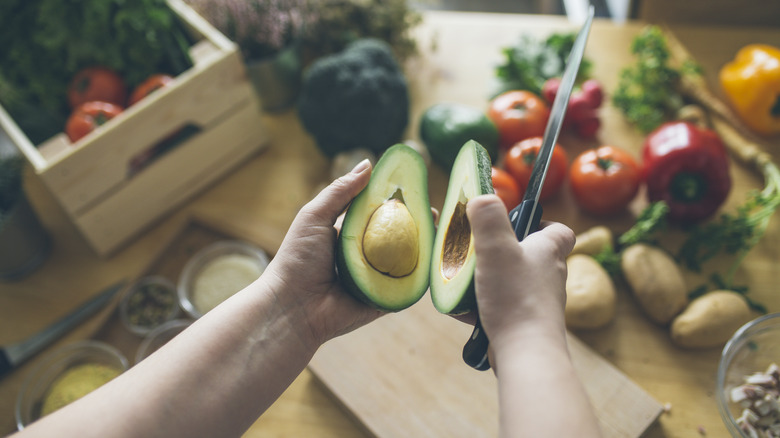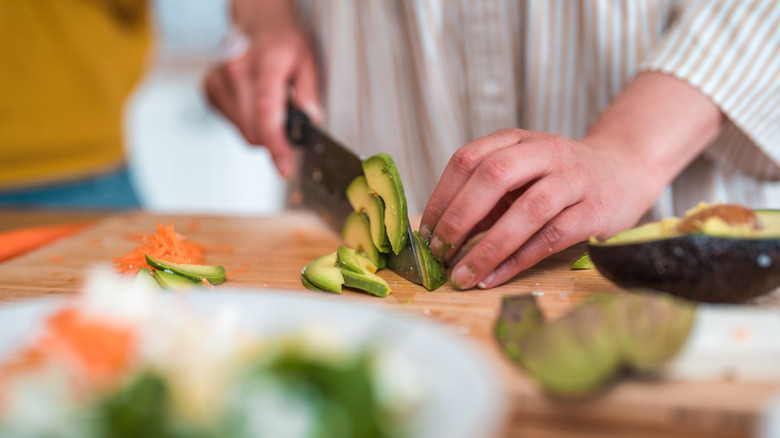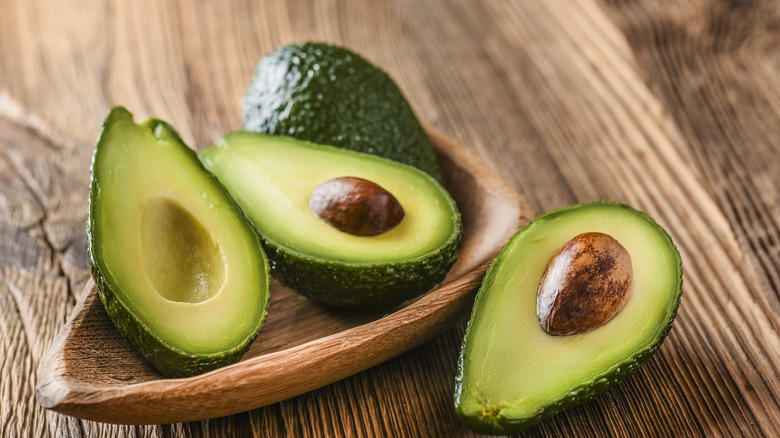Metal Knives Are Spoiling Your Avocados. Here's What To Use Instead
A love for avocados is a true and all-encompassing love. If you're the type to pay extra for guac and never skimp on avocados, then it pays to know all the tricks for extending their lifespan. Because while avocados have a special place in our hearts and on our toast, they also have a frustratingly short lifespan — and all too often, a place in the compost bin sooner than we'd like. Notorious for shifting from bright green and too hard to slice to mushy and black in what seems like a blink of an eye, avocados need proper storage and preparation.
There are plenty of avocado hacks to have in your arsenal, but one lesser-known hack to increase the longevity and quality of your 'cados has to do with the knives you use. It's a little-known fact, but the materials you use to slice into that perfectly ripe avocado matter. If you use a metal knife, which most everything from chef to paring to bread knives are, you kick off a chemical process in the flesh of the fruit. (Yes, it's a fruit!) The knife's metal interacts with the avocado's enzymes and speeds up a natural process called oxidation. That process is what causes the avocado to turn brown, so to keep yours green as long as possible, dodge this mistake and opt for a ceramic or plastic-bladed knife.
Why metal knives are a no-no, on a scientific level
While grabbing whatever knife you have in your drawer might be second nature when that avocado is finally perfectly ripe and ready to slice, it pays to slow your roll. Have a different dedicated knife just for this purpose that won't introduce metal into the equation. By using a metal knife, you cause oxidation to set in more rapidly due to the makeup of the material mingling with the makeup of the fruit. The copper and/or iron contained in the blade of many common kitchen knives — like stainless steel knives — reacts with the enzymes in the plant's flesh, which are called polyphenol oxidase. The result is browning, which not only looks unpleasant but actually can diminish some of its flavor, too.
This unwanted oxidation occurs due to two main culprits — the disruption of the cellular structure that contains the enzymes and the introduction of oxygen. So no matter what you slice your avocado open with, the process will occur with the presence of oxygen, but no need to make a knife mistake that hastens the process. In other words, avocados will brown regardless of what type of knife you use or however well you try to preserve them, but metal knives speed up the inevitable.
There are additional ways to extend the lifespan of avocados
It's true, you can't stop avocados from browning altogether once they're opened up to the elements. The same thing goes, for that matter, for an apple, potato, and many other fruits and veg. They all contain enzymes within the produce's fleshy tissue, and when introduced to oxygen, the process of browning or oxidation begins no matter how you slice it, literally. There are certain tips and tricks you can employ with all your produce drawer picks, including avocados — like keeping them refrigerated and applying an acid, like lemon juice, to the surface of, say, a sliced apple — to ward off the darkening for longer.
In the case of keeping your avocados beautiful and green for longer, employ the same hacks you might use for an apple — a spritz of acidic lemon juice halts the oxidation process by altering the pH levels, lowering them, and warding off the browning for longer. After slicing your avocado with your plastic or ceramic knife, reducing the oxygen it's exposed to will contribute to greener flesh for longer as well. Storing with a sliced onion has also been shown to help! And always tightly wrap in plastic wrap and keep refrigerated — or better yet, mash into a crave-worthy guacamole and eat right away, before oxidation has a chance to take hold.


